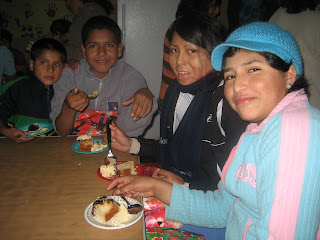.jpg) No matter how often, or for how long you go, Dr. Tony's, Hogar San Francisco de Asis, is always such a delight! I love how it always welcomes you; complimented by delighted holas and hugs. I told them I would visit at least once a month. I made it back there four times so far (counting the quick one-hour visit). Though they reminded me I missed May. Haha. The last time I went was with Nikhil at the end of July which was really nice. I love telling people about the Hogar! It is definitely one of the most precious experiences I've had here in Peru and am so glad to be able to share it.
No matter how often, or for how long you go, Dr. Tony's, Hogar San Francisco de Asis, is always such a delight! I love how it always welcomes you; complimented by delighted holas and hugs. I told them I would visit at least once a month. I made it back there four times so far (counting the quick one-hour visit). Though they reminded me I missed May. Haha. The last time I went was with Nikhil at the end of July which was really nice. I love telling people about the Hogar! It is definitely one of the most precious experiences I've had here in Peru and am so glad to be able to share it..jpg)
There are always new faces, volunteers and kids, but it always feels so nice and familiar. I love seeing the kids again, and seeing how they are improving, and changing. I have ones that I made stronger connections with and it is always fun catching up with them. Most of the older ones, especially the older girls, do a lot in the house. They are really lovely. They do a lot in the house; help the cooks in the kitchen with meals, bring food to the ones who are confined to their beds, take care of the younger kids and a great many more little things.
.jpg)
Though, at times, there is sad news as well. I remember talking with my roomies at the Hogar, Cristina and Rachel, about how it was amazing the amount of jokes, happiness and hope there was at Dr. Tony's, despite the many infirmities, disabilities and everyday struggles. On the first few days, when you see and meet all the kids, some of their medical conditions are easily apparent, like the severe burn victims; but after awhile, you don’t even notice it. It is simply a house full people from all over Peru, brought together to the Hogar in Chaclacayo, who smile, laugh and love together. Most importantly, there is support and acceptance, it is a place where everyone can find their niche and fit in. I am continually amazed at how awesome the Hogar is.
.jpg)
At first, when kids come to the Hogar, many of them part from their parents, or the guardians who bring them, in tears or close to tears. But in little time, they are completely fine and the Hogar is like their home. I think it is mostly the kids themselves who help with the new ones to adjust, since they have been through it themselves. Even the littlest ones have impressed me with their advice. I remember one little boy telling a little girl that she didn’t have to cry and miss her mom so much because ‘She had lots of mamitas here,’ a house full of them in fact. Everyone calls the two cooks, who have been at the Hogar since its conception, Irma and Clotilde, mamita. There are mothers in the kitchen, in the hall outside the rooms, in the classroom at the house; in the therapy room; there’s not a fault of mamitas. In Peru, many people are called mamita, an affectionate term here.
I remember that little girl constantly needing to be assured that I was there, always asking for me when I wasn't with her, asking where I would be sleeping at night, asking where another volunteer was, where were they going, when they would be back. Now, instead of the quick tears ready to flow and all the insecurities, that same little girl is all smiles and can fend for her own and than some, if need be. Instead of crying when I say goodbye, she gives me a big smile and tells me goodbye. It's so great to see how these kids change! And so fast! It's fun to see the development of each kid. Every time I go there are changes...
Was planning to visit the Hogar tomorrow but am stuck in the house with a cold. A bit sad since I haven't been there for awhile and told the girls I'd be visiting this Sunday. I guess I will have to save my visit for another time! In Peru you always have to be up for plans changing. I guess I've lucked out that I was never a person who had to plan every little thing; it’s important to be up for anything that comes up, be aware that things never start on time... So next tentative plan: visiting the Hogar next weekend!
Was planning to visit the Hogar tomorrow but am stuck in the house with a cold. A bit sad since I haven't been there for awhile and told the girls I'd be visiting this Sunday. I guess I will have to save my visit for another time! In Peru you always have to be up for plans changing. I guess I've lucked out that I was never a person who had to plan every little thing; it’s important to be up for anything that comes up, be aware that things never start on time... So next tentative plan: visiting the Hogar next weekend!

